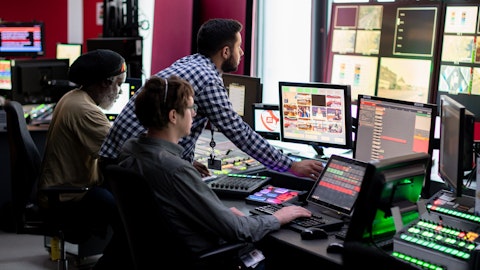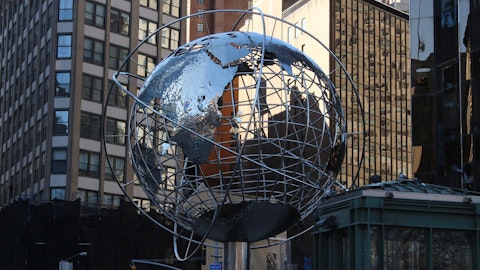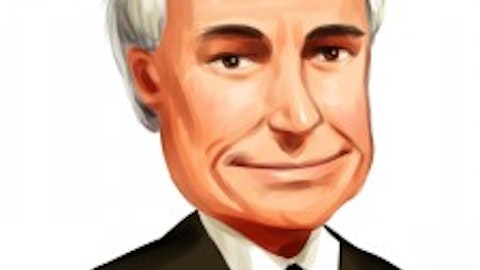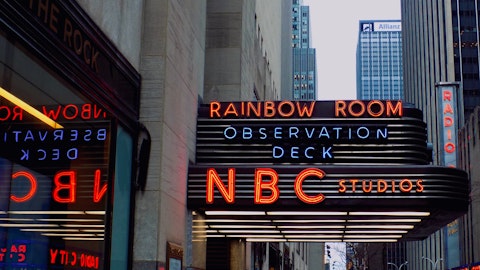Michael Morris: I want to ask one about the strikes and one about the international business. First, on the strikes, David. From the outside, it does feel like the 2 sides are very far apart. And so I’d love to hear if you could characterize how far apart you feel that the sides are, recognizing that you’re being negotiated on behalf of but your interests are obviously very much at stake here. So I’d love to hear just sort of your thoughts on how far part the sides are and how influential do you feel like you can be on bringing sides together. And then second, on the international business. You made constructive comments about the opportunity there. Obviously, your international business has a pretty big mix of brands and partnerships, licensing arrangements.
So can you maybe talk about the strategic vision here? Is your ambition to have one strong single brand over time, similar to the way Netflix is structured? And maybe more tactically, what are some of the milestones or initiatives over the next 12 months that you’re looking to achieve?
David Zaslav: Well, look, on the strike, I’m very focused on it because this is our business, this is all we do. And get it — and it’s critically important that everybody, the writers, the directors, the actors, the producers, all the below-the-line crews, everyone needs to be fairly compensated and they need to feel valued and feel that they’re fairly compensated in order to do their best work. And that we have to focus on getting that done. I’m hopeful that it’s going to happen soon. I’m going to I think all of us in this business are very keen to figure out a solution as quickly as possible. We are in some uncharted waters in terms of the world as it is today and measuring it all. And so I think in good faith, we all got to fight to get this resolved and it needs to be resolved in a way that the creative community feels fairly compensated and fully valued.
Jean-Briac Perrette: And then, Michael, as it relates to international, certainly on the streaming side, we will be moving to one unified consistent brand with the launch of Max over the next 12 months, with the rollout plan for LatAm, EMEA and then APAC. So absolutely, over the course of sort of the next 12 months, that’s the road map and the plan we’re on. I think the second piece is we’re obviously excited as we think about content mix, particularly in an environment where, to David’s point about the strike, we do have great original productions happening outside the U.S. as well, both for Max as a platform as well as our local networks and that content will feed Max as well. And so the mix of powerful global IP and global content coming largely out of the U.S. as well as local content produced by our local teams in markets, particularly in Europe and LatAm, that mix to drive penetration of Max outside the U.S. we think is very powerful.
And then on top of that, we have, obviously as David alluded to earlier, our sports. And as we think about Europe, in particular with the Olympics and in coming home to Europe next summer, will be a great launch platform for us in EMEA.
Operator: Your final question comes from the line of Phil Cusick with JPMorgan.
Philip Cusick: Congrats on Barbie. I’m excited for Shaq and Charles to discuss a Barbie-Superman team up, that would be great. Following up 2 things. Following up on John’s question, it sounds like NHL is coming to Max and we should think about Max as the path for more of your Turner Sports over time. How does that impact Max pricing? Can you put those sports on and keep prices around this level? Or do you think we need a substantial increase to get there? And then second, on lower DTC churn in the quarter, was that driven by, I think you mentioned — what’s the remaining discovery HBO overlap, that’s sort of latent churn? And what do you see in the pace of that consolidation going forward?
David Zaslav: We think it’s a real asset, all the sports rights that we have. We will — we have a real strategic plan that we’re finalizing and we’ll take it to you guys and be very clear about exactly how we’re going to use news and sports in — on our platforms and for — to build value for the future in the near term. JB?
Jean-Briac Perrette: Yes. I mean I think as David alluded to earlier, in sports, we have a mix of models today across. Largely in Europe, it is priced in an incrementally priced tier. In LatAm, we have some sports bundle, a mix there as well. We have some local football or soccer in a separately priced tier. We have Champions League in Mexico and Brazil, priced within the entertainment offering. I think generally, our view is sports is a such a premium offering with a very focused and passionate fan base. But generally, the model will require some way to find — need to find incremental value to get out of it. And so exactly how that comes to market, we will have more to say later in the year. But generally, our view is that it needs to be monetized incrementally, let’s put it that way.





